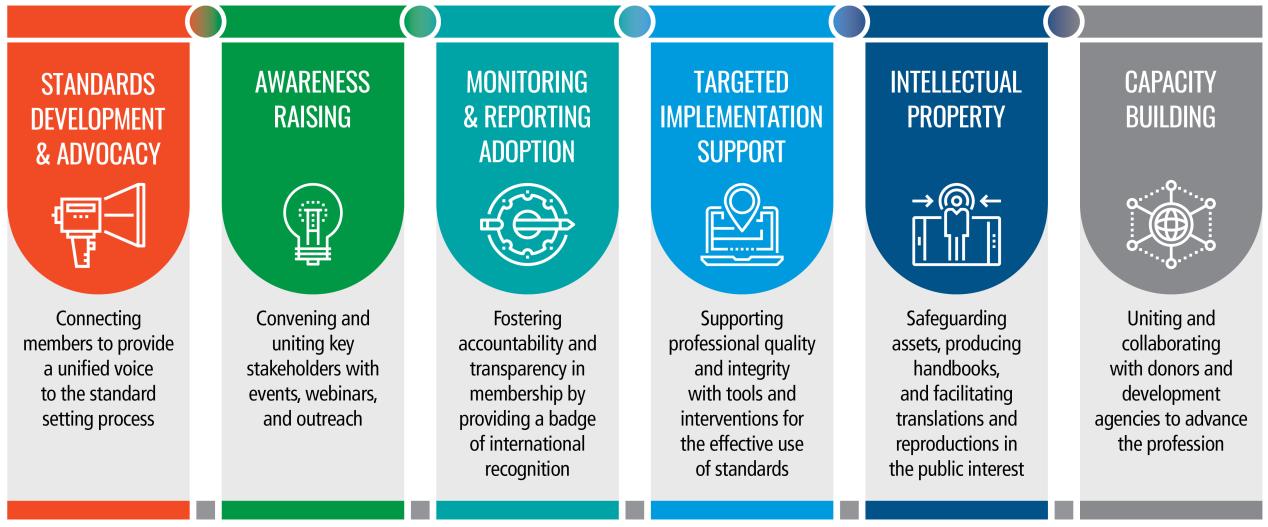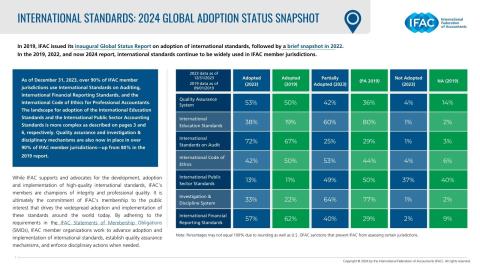There are six core IFAC activities that support the development, adoption and implementation (A&I) of high-quality international standards.

1) Standards Development & Advocacy
We develop the International Education Standards with the assistance of the International Panel on Accountancy Education and support the development of public sector, audit & assurance and ethics standards by the IPSASB, IAASB and IESBA (the SSBs). This includes providing certain operational and administrative support services.
Leveraging our voice representing our members and the global accountancy profession, we provide extensive feedback on new and revised international standards, primarily to the IAASB and IESBA. This includes formal consultation responses, providing targeted letters on quarterly standard-setting board agendas, and regular targeted meetings on specific projects. It also includes facilitating access to constituency groups, such as IFAC’s Small and Medium Practices and Professional Accountants in Business Advisory Groups, as well as the International Standards Community of Practice.
IFAC Comment Letters
-
IFAC Response to the IAASB’s Proposed Narrow Scope Amendments to ISQMs and ISAs
March 27, 2025 -
IFAC Response to IESBA Consultation on Auditor Independence: CIVs and Pension Funds
June 24, 2025 -
IFAC’s Response to the IAASB’s ISA 240 Fraud Exposure Draft
June 5, 2024 -
IFAC’s Response to the IESBA’s Proposed Revisions to the Code Relating to Using the Work of an External Expert
April 30, 2024 -
Global Accountancy Profession’s Response to the IESBA’s Proposed International Ethics Standards for Sustainability Assurance
May 10, 2024 -
IFAC Response to the IAASB’s Proposed Narrow Scope Amendments to International Standards
April 10, 2024 -
IFAC SMPAG Response to the IAASB's Going Concern Consultation
August 23, 2023 -
IFAC SMPAG Response to IESBA Strategy and Work Plan 2024-2027 Consultation Paper
July 6, 2023 -
SMPAG Response to the IESBA Exposure Draft of Proposed Revisions to the Code Addressing Tax Planning and Related Services
May 17, 2023 -
SMPAG Response to the IAASB’s Exposure Draft of proposed International Standard on Auditing 500 (Revised), Audit Evidence
April 24, 2023
2) Intellectual Property
The Intellectual Property (IP) department facilitates access to IFAC publications as well as the international standards, supplementary, and non-authoritative publications issued by the SSBs, while simultaneously ensuring they are being properly used and protected through copyright, trademark, and other laws.
To reproduce or translate content issued by IFAC, including standards developed by the SSBs, a permission request is required to be submitted through the online permission request system (OPRI). Access to recently completed or in progress translations are accessible via the Translations Database.
We also facilitate the formatting and publication of SSB Handbooks, pronouncements and other accompanying materials.
3) Awareness Raising
We promote SSB consultations and final pronouncements, as well as adoption and implementation initiatives through our communication channels, including on social media.
We organize events, webinars and outreach covering international standards and involves SSB representatives. This includes organizing new regional IFAC Connect Global Events Series which bring together professional accountancy organizations (PAOs), firms, regulators, standard setters, business and investor communities to address strategic priorities, share intelligence and facilitate key stakeholder collaboration.
4) Targeted Implementation Support
We develop specific materials (e.g., guides, tools, articles and videos) to support the effective and consistent implementation of international standards by professional accountants. We also facilitate access to other resources through the Knowledge Gateway.
5) Tracking & Reporting Adoption
We track the adoption of international standards. The data comes from the IFAC Member Compliance Program, a longstanding initiative designed to support and elevate accountancy organizations worldwide which all IFAC members must participate in. In joining IFAC, PAOs commit to actions that will advance adoption and implementation of international standards as well as establishing quality assurance and enforcement systems. These commitments are codified in the Statements of Membership Obligations (SMOs). PAOs are required to submit reports (SMO Action Plans) demonstrating how they are progressing with fulfilling the SMOs and any challenges. The SMO Action Plans and information contained in the accompanying IFAC-produced assessments are subsequently published on our website via the International Standards’ Adoption Map.

We produce regular summary publications (see 2024, 2022, 2019 and 2017) which highlight how widely international standards, as well as quality assurance and enforcement systems, are used or in place across IFAC member jurisdictions.
6) Capacity Building
We lead MOSAIC (Memorandum of Understanding to Strengthen Accountancy and Improve Collaboration) to improve cooperation and collaboration between IFAC and the international development community.
We work in collaboration with Development Partners to facilitate access to resources for support and development. IFAC is uniquely positioned to spearhead initiatives that demand global reach, freedom from commercial interests, and the ability to create dialogue and debate.
Through close engagement with our PAOs, we understand specific jurisdiction challenges and coordinate on solutions and targeted initiatives for how these can be addressed. This includes overseeing donor-funded capacity building programs.
We undertake targeted outreach for specific jurisdictions to engage with PAOs, regional organizations and other stakeholders to progress adoption, which often involves support from the PAODAG.
